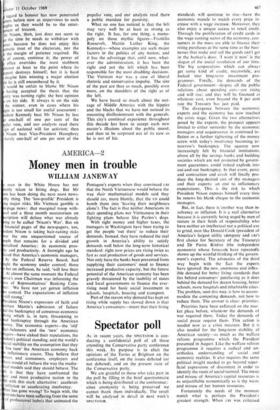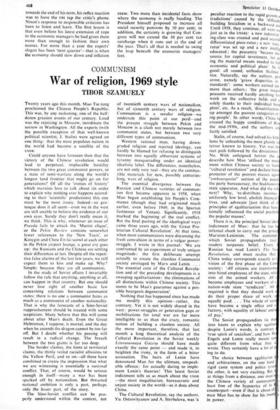AMERICA-2
Money men in trouble
WILLIAM JANEWAY
man in the White House has not denly taken to biting dogs. But Mr on has been doing the next most news- rthy thing. The low-profile' President is ng major risks. His Vietnam gamble is t-page news : that marginal troop with- wal and a three month moratorium on cription will defuse what was already ng to be _called Nixon's War'. But on financial pages of the newspapers, too, *dent Nixon is taking hair-raising risks ver the one unquestioned source of ngth that remains for a divided and ralised America : its economic pros- ty and productivity. A fortnight ago he ared that America's economic managers, by the Federal Reserve Board, had ught the economy under control; those bet on inflation, he said, 'will lose their . At almost the same moment the Federal ve's own Chairman was informing the se of Representatives' Banking Com- e: 'We have not yet gotten inflation er control. The expectations of inflation still strong: sident Nixon's expression of faith and irman Martin's admission of failure al the bankruptcy of consensus economic king which is, in turn, threatening to • d bankruptcy through the American omy. The economic experts—the 'old' get-balancers and the 'new' economic agers--have staked their reputations, the dent's political standing, and the world's neml stability on the assumption that they 'fine tune' the American economy back inflationary excess. They believe that tors and consumers, employers and kers would all behave the way the mathe- cal models said they should behave. The It is that they have confronted the t and most productive nation in the • With this stark alternative : accelerat- inflation or accelerating insolvency. hat has gone wrong? To begin with, the enlists have been suffering from the same of professional hubris that animated the Pentagon's experts when they convinced as that the North Vietnamese would behave the way their mathematical models said they should (or, more bluntly, that the us could bomb them into 'leaving their neighbours alone'). The fact is that neither Americans in their spending plans nor Vietnamese in their fighting plans behave like Pavlov's dogs.
With tight money and higher taxes, the managers in Washington have been trying to get the people 'out there' to reduce their demands. Instead, they have reduced the real growth in America's ability to satisfy demands well below the long-term historical standard: right now prices are rising twice as fast as real production of goods and services. Not only have the banks been prevented from supplying their customers' need to finance increased productive capacity, but the future potential of the American economy has been gravely threatened by the inability of states and local governments to finance the ever- rising need for basic social investment in schools, hospitals, housing and transport.
Part of the reason why demand has kept on rising while supply has slowed down is that America's consumers—intent that their living standards will continue to rise—have the economic muscle to match every price in- crease with a wage increase. Moreover, they also enjoy a unique access to retail credit. Through the proliferation of credit cards in the wage-earning sector of the economy, con- sumers in the mass are able to finance their rising purchases at the same time as the busi- nesses that make and sell the goods can't get in the banker's door. 'I want it now' is the slogan of the social revolution of our time.
The big corporations which can always get some kind of credit, meanwhile, are locked into long-term investment pro- grammes. Finally, the demands of the Federal government—despite all the public relations about spending cuts—are rising and will rise; and they will be financed at whatever cost, even beyond the 8 per cent rate the Treasury has just paid.
The divergence between the economic experts and the economy has now reached the crisis stage. Given the two alternatives posed by the experts, the prospect appears limited to either surrender by the economic managers and acquiescence in continued in- flation or a further tightening of the money screw with today's insolvency becoming to- morrow's bankruptcy. The squeeze now increasingly felt by financial institutions, above all by the savings banks and building societies which are not protected by govern- ment guarantees, could indeed explode into out-and-out bankruptcy. In that event, panic and contraction and crash will finally pro- duce the long-desired aim of the managers and their experts: an end to inflationary expectations. This is the risk to which President Nixon exposes himself every time he renews his blank cheque to the economic managers.
But, in fact, there is 'another way than in- solvency or inflation. It is a real alternative because it is currently being urged by men of stature in their fields of responsibility who have neither an intellectual nor a political axe to grind, men like Donald Cook (president of America's largest utility company and Las's first choice for Secretary of the Treasury) and Dr Pierre Rinfret (the independent economist whose forecasts have repeatedly shown up the wishful thinking of the govern- ment's experts). The advocates of the third way begin with the fact the experts have ignored: the new, enormous and inflex- ible demand for better living standards that lies behind consumers' purchasing as it does behind the demand for decent housing, better schools, more hospitals and inhabitable cities. The problem, seen this way, is how to accom- modate the competing demands, not how to reduce them. The answer is clear: priorities.
Priorities have been enforced on the mar- ket place before, whenever the demands of war required them. Today the demands of social peace require them. This action is needed now as a crisis measure. But it is also needed for the long-term stability of American society—as much as the welfare reform programme which the President presented in August. Like the welfare reform programme it requires a radical and un- orthodox understanding of social . and economic realities. It also requires the same political insight needed to go beyond super- ficial expressions of discontent in ordex to identify the roots of social turmoil. The waste and misuse of America's capital resources is as unjustifiable economically as is the waste and misuse of her human resources.
Fortunately the needs of the moment match what is perhaps the President's greatest strength. When LW was criticised towards the end of his term, his reflex reaction was to have the FBI tap the critic's phone. Nixon's response to responsible criticism has been to listen and learn. The first lesson is that even before his latest extension of rope to the economic managers he had given them more than enough to fashion their own nooses. For more than a year the experts' slogan has been 'next quarter'—that is when the economy should slow down and inflation
cease. Two more than incidental facts show where the economy is really heading. The President himself proposed to increase all social security pensions by 10 per cent; in addition, the certainty is growing that Con- gress will not extend the 10 per cent tax surcharge when it runs out at the end of the year. That's all that is needed to swing the trap beneath the economic managers' feet.











































 Previous page
Previous page